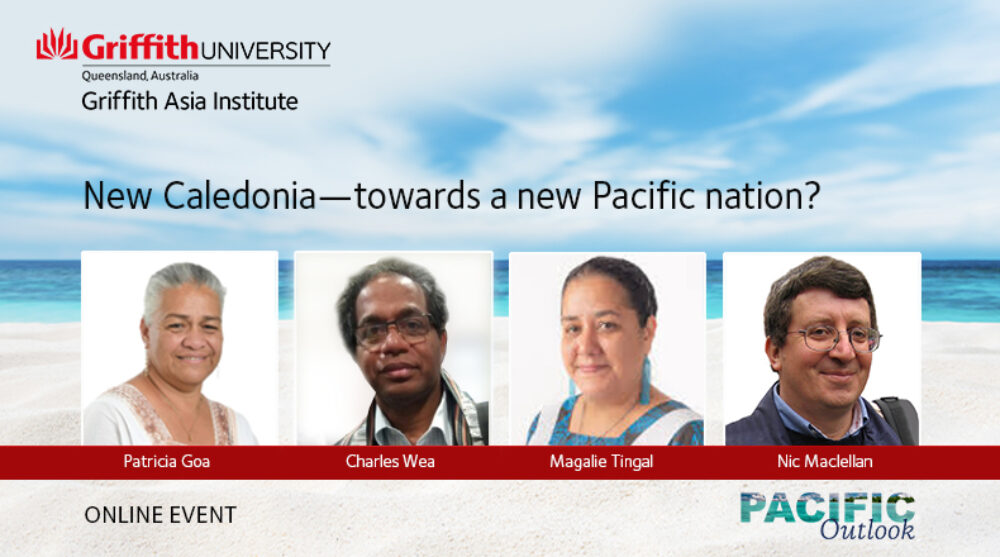In-conversation with Patricia Goa, Charles Wea, Magalie Tingal and Nic Maclellan.
On Sunday 4 October, New Caledonians will vote in a referendum on their political future. Long term residents of the French Pacific dependency – one of Australia’s closest neighbours – will vote yes or no on independence from France. Most indigenous Kanak support the call for independence and sovereignty, but must gain support from non-Kanak communities to gain a majority.
The referendum comes at a time of significant economic and social challenge, during the global pandemic. New Caledonia faces changing demand for nickel exports, the loss of international tourism and a rising cost of living for the vulnerable.
On 17 September, Griffith Asia Institute hosted a webinar on “New Caledonia – towards a new Pacific nation?” Journalist Nic Maclellan interviewed three leading Kanak activists Patricia Goa, Charles Wea, and Magalie Tingal, to discuss prospects for the 2020 referendum and the challenges on the path to self-determination under New Caledonia’s Noumea Accord.
The discussion ranged over many issues facing the people of New Caledonia: how young people voting for the first time are responding to the call for independence; the role of the nickel sector in economic and social development; the future of post-independence relations with France as well as Asia-Pacific nations like China, Korea and Australia; and the status of women in Kanak custom and New Caledonian institutions.
As a leading referendum campaigner for the independence movement FLNKS, Magalie Tingal highlighted the need to decolonise minds as well as institutions: “Our elders put us on the path to decolonisation. But we are also talking about the decolonisation of our minds. Independence is scary for some people here, so we have to educate people through meetings, discussion and information. We are talking about living together.”
Patricia Goa is an elected member of New Caledonia’s Congress from the Northern Province. She has seen the rural north of the main island transformed by the construction of a major nickel smelter at Koniambo, with the province’s development organisation holding 51% control of the joint-venture Koniambo Nickel SAS (KNS): “KNS is a major player in the economic rebalancing of our country. New Caledonia holds one quarter of the world’s nickel resources and the nickel sector is the largest employer in New Caledonia. But nickel resources are not renewable. We really have to think about how are working for future generations – that’s what our cultural heritage is saying.”
Charles Wea has represented the FLNKS in Australia and with the Melanesian Spearhead Group (MSG), which unites nearby Melanesian nations. Today, through the MSG and Pacific Islands Forum, New Caledonia has built new trade and commercial ties to neighbouring Pacific countries. Today, with the export of nickel ore and the construction of a joint venture smelter in China, New Caledonia is a significant player in global markets for the strategic metal – but this causes problems at a time of US-China tension.
Charles Wea said that an independent nation would maintain ties with France but build new relationships in the Pacific region: “If New Caledonia were to become independent tomorrow, we would establish relations with countries that we share values with. Secondly, we would build relations with countries where we have economic, political and cultural interests. For example, we already have an offshore smelter in Korea, so that’s the sort of country where we have to establish a bilateral relationship.”
As Magalie Tingal says: “For the FLNKS, independence doesn’t mean we close our doors to France or anyone. Independence opens us up to the international stage.”
This conversation is one of many that are ongoing as New Caledonia approaches the second referendum in a few days’ time.








